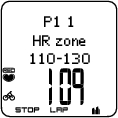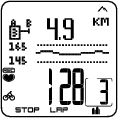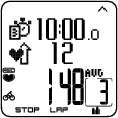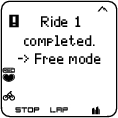Create and download a personalized training program to your cycling computer by using Polar ProTrainer 5 software. This chapter includes the basic instructions on how to navigate and manage the program once you have downloaded it to your cycling computer. For further information on creating programmed exercises with the software, transferring them to your cycling computer, and analyzing your performance after training, consult Polar ProTrainer 5 help.
After downloading the training program, two additional menus are shown in your cycling computer where you can view your program and check your daily schedule. Scroll weeks, days, and exercises with or . Select week and day with .
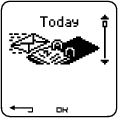
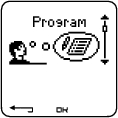
To view your weekly program
Select Program > Week view
The week view offers an overview of your weekly exercises. The white bar represents planned exercise time and the black bar represents performed exercise time. Weekly target exercise time is shown below the bars.
Press and hold to view the following information on the week:
Week info: Week name and description.
Targets: Summary of targets for the week. Calories, distance, and duration. Planned time for sport zones: press and scroll between sport zones with or .
Results: Summary of results for the week. Calories, distance and duration. Performed time in sport zones: press and scroll between sport zones with or .
Reminder: Set alarm (on time, 10 min, 30 min or 1 hour before the exercise) and define sound type (Silent, Beep, Normal).
Program off: Remove the program from your cycling computer.
To view your daily program
Select Program > Week view > Day view
Select Today > Exercise view
The day view offers an overview of your daily exercises. The white bar represents planned exercise time and the black bar represents performed exercise time. Daily target exercise time is shown below the bars.
Press and hold to view additional information on the day:
Targets: Summary of targets for the day. Calories, distance, and duration. Planned time for sport zones: press and scroll between sport zones with or .
Results: Summary of results for the day. Calories, distance, and duration. Performed time in sport zones: press and scroll between sport zones with or .
View your daily exercise
Select Program > Week view > Day view > Exercise view
The exercise view shows the following information: exercise name, description, and target duration.
Press and hold to view following information:
Targets: Summary of targets for the training session. Calories, distance and duration. Planned time for sport zones: press and scroll between sport zones with or .
Phases: Summary of phases for the training session.
Sport profile: View the name of chosen sport profile. For further information, consult Polar ProTrainer 5 software help.
Reminder: Set the reminder time.
If you set a reminder, your cycling computer will remind you to train according to plan on the scheduled date. View the planned exercise information by pressing when the reminder has gone off.
Start Daily Exercise
Select Today > Exercise view (name of the exercise) >
Select Program > Week view > Day view > Exercise view > >
For further information on exercise recording, see Start Training. Your cycling computer will guide you through the session.
Below is an example of an interval exercise, which is divided into four phases:
Warm up / P1: Cycle 15 minutes at a heart rate between 60-70% of your maximum heart rate.
Interval / P2: Cycle 5 km at a heart rate between 80-90% of your maximum heart rate.
Recovery / P3: Cycle 5 min at heart rate between 55-65% of your maximum heart rate. Repeat phases 2 and 3 for three times each.
Cool down / P4: Cycle 15 minutes at a heart rate between 55-65% of your maximum heart rate.
During the exercise you will see the following display types:
| | Every phase starts with a display showing: Phase name Zone type Zone limits |
| | During exercise the phase display shows: Countdown timer/distance, count up timer, number of current phase Target zone in graphical format (updated every 10 seconds, showing the last 8 minutes on the display) Heart rate Number of phase repeats left |
| | Every phase ends with a phase-end display showing: Phase duration or distance Heart rate difference (how much you have increased or decreased your heart rate during the phase) or average speed Average heart rate Number of ended phase |
| | Once a programmed exercise is over, this display shows that the exercise is completed, Ride 1 completed will appear. The cycling computer enters Free exercise mode, and you can continue exercising without settings. The exercise is recorded and filed. |
For further information on planning the sessions and transferring them to your cycling computer with the Polar ProTrainer 5 software, consult software help.
Change the same settings in a programmed exercise as with any other exercise type. For further information on different functions during exercise, see Button Functions During Exercise.
The programmed exercise uses the sport profile settings set in the Polar ProTrainer 5 software. If you change the cycling computer settings during exercise (e.g. calibration factor), the changes will only apply to the current exercise. Next time you start the same exercise, the cycling computer will use the sport profile settings defined in the software.
To see the lap menu during programmed exercise, press and hold OK. Scroll between options with or and select with . The contents of the lap menu depend on your exercise.
End phase: End current phase and move to the next phase in the exercise.
Jump to: Move to any other phase in your exercise.
To view exercise results Select File > Exercise log
After completing a programmed exercise, your training data will be saved under File. For further information, see Analyze Exercise Results.
